浙江省杭二中高一下册第二学期期中考试英语试卷【优选】
浙江省杭州2022-2023学年高一下学期期中考试 英语含答案
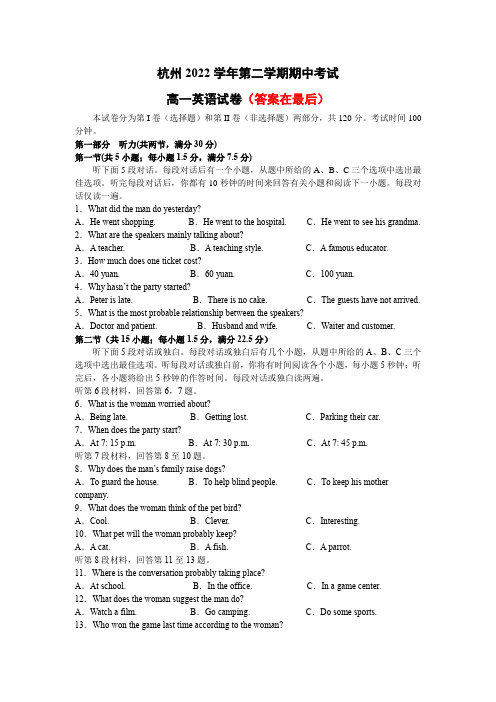
杭州2022学年第二学期期中考试高一英语试卷(答案在最后)本试卷分为第I卷(选择题)和第II卷(非选择题)两部分,共120分。
考试时间100分钟。
第一部分听力(共两节,满分30分)第一节(共5小题;每小题1.5分,满分7.5分)听下面5段对话。
每段对话后有一个小题,从题中所给的A、B、C三个选项中选出最佳选项。
听完每段对话后,你都有10秒钟的时间来回答有关小题和阅读下一小题。
每段对话仅读一遍。
1.What did the man do yesterday?A.He went shopping.B.He went to the hospital.C.He went to see his grandma. 2.What are the speakers mainly talking about?A.A teacher.B.A teaching style.C.A famous educator. 3.How much does one ticket cost?A.40 yuan.B.60 yuan.C.100 yuan.4.Why hasn’t the party started?A.Peter is late.B.There is no cake.C.The guests have not arrived. 5.What is the most probable relationship between the speakers?A.Doctor and patient.B.Husband and wife.C.Waiter and customer.第二节(共15小题;每小题1.5分,满分22.5分)听下面5段对话或独白。
每段对话或独白后有几个小题,从题中所给的A、B、C三个选项中选出最佳选项。
听每段对话或独白前,你将有时间阅读各个小题,每小题5秒钟;听完后,各小题将给出5秒钟的作答时间。
每段对话或独白读两遍。
浙江省杭州市萧山二中高一英语下学期期中试题

20 12 学年第二学期期中考试题卷学科:高一英语总分值:100 分考试时刻:90分钟考生须知:一、本卷共8页;二、本卷答案必需做在答案卷上,做在试卷上无效;3、答题前请在答题卷密封线内填好相关栏目。
听力(20%)第一节听下面5段对话。
每段对话后有一个小题,从题中所给的A、B、C三个选项当选出最正确选项,并标在试卷的相应位置。
听完每段对话后,你都有10秒钟的时刻来回答有关小题和阅读下一小题。
每段对话仅读一遍。
1. What is the possible relationship between the two speakers?A. Employer and employee.B. Next door neighbors.C. Two good friends.2. What will the two speakers most probably do this weekend?A. See a film.B. Climb a mountain.C. Play table tennis.3. What time will the train leave?A. At 6:10 tomorrow morning.B. At 11:00 tonight.C. At 11:00 tomorrow morning.4. What does the man mean?A. He is waiting for someone else.B. He doesn’t want to talk with Mr. Miller.C. He is busy now.5. Where does the conversation take place?A. In a restaurant.B. In a department store.C. In a hotel.第二节听下面5段对话或独白。
每段对话或独白后有几个小题,从题中所给的A、B、C三个选项当选出最正确选项,并标在试卷的相应位置。
浙江省杭州第二中学等四校联盟2022-2023学年高一下学期期中考试英语试题
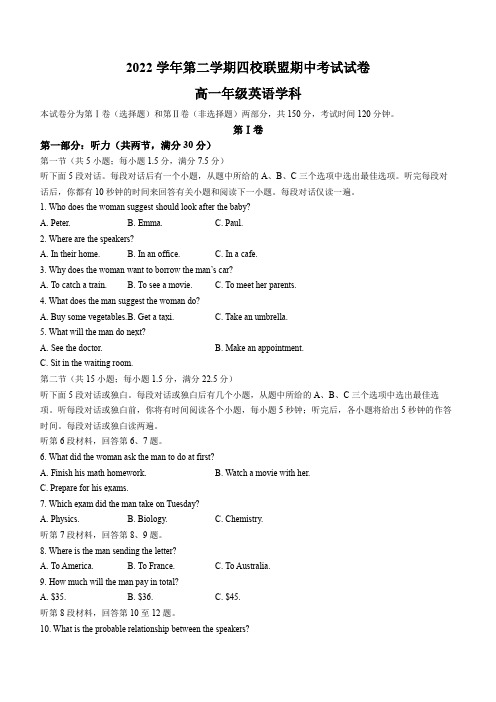
2022学年第二学期四校联盟期中考试试卷高一年级英语学科本试卷分为第Ⅰ卷(选择题)和第Ⅱ卷(非选择题)两部分,共150分,考试时间120分钟。
第Ⅰ卷第一部分:听力(共两节,满分30分)第一节(共5小题;每小题1.5分,满分7.5分)听下面5段对话。
每段对话后有一个小题,从题中所给的A、B、C三个选项中选出最佳选项。
听完每段对话后,你都有10秒钟的时间来回答有关小题和阅读下一小题。
每段对话仅读一遍。
1. Who does the woman suggest should look after the baby?A. Peter.B. Emma.C. Paul.2. Where are the speakers?A. In their home.B. In an office.C. In a cafe.3. Why does the woman want to borrow the man’s car?A. To catch a train.B. To see a movie.C. To meet her parents.4. What does the man suggest the woman do?A. Buy some vegetables.B. Get a taxi.C. Take an umbrella.5. What will the man do next?A. See the doctor.B. Make an appointment.C. Sit in the waiting room.第二节(共15小题;每小题1.5分,满分22.5分)听下面5段对话或独白。
每段对话或独白后有几个小题,从题中所给的A、B、C三个选项中选出最佳选项。
听每段对话或独白前,你将有时间阅读各个小题,每小题5秒钟;听完后,各小题将给出5秒钟的作答时间。
每段对话或独白读两遍。
听第6段材料,回答第6、7题。
6. What did the woman ask the man to do at first?A. Finish his math homework.B. Watch a movie with her.C. Prepare for his exams.7. Which exam did the man take on Tuesday?A. Physics.B. Biology.C. Chemistry.听第7段材料,回答第8、9题。
杭州二中2012-2013学年高一下学期期中英语试题
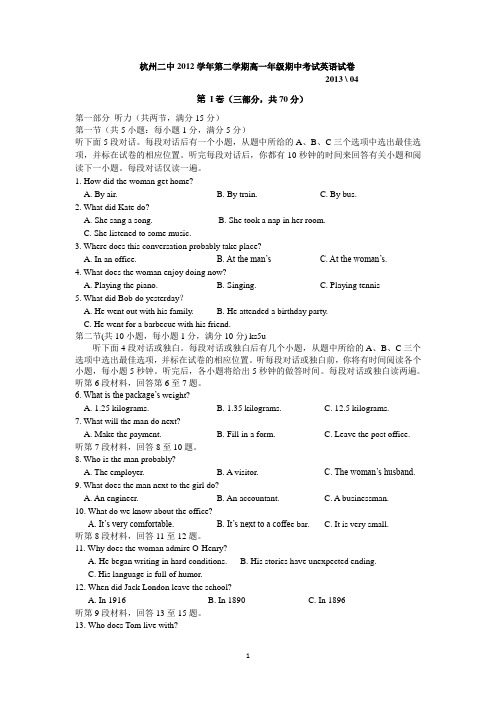
杭州二中2012学年第二学期高一年级期中考试英语试卷2013 \ 04第I卷(三部分,共70分)第一部分听力(共两节,满分15分)第一节(共5小题:每小题1分,满分5分)听下面5段对话。
每段对话后有一个小题,从题中所给的A、B、C三个选项中选出最佳选项,并标在试卷的相应位置。
听完每段对话后,你都有10秒钟的时间来回答有关小题和阅读下一小题。
每段对话仅读一遍。
1. How did the woman get home?A. By air.B. By train.C. By bus.2. What did Kate do?A. She sang a song.B. She took a nap in her room.C. She listened to some music.3. Where does this conversation probably take place?A. In an office.B. At the man‟sC. At the woman‟s.4. What does the woman enjoy doing now?A. Playing the piano.B. Singing.C. Playing tennis5. What did Bob do yesterday?A. He went out with his family.B. He attended a birthday party.C. He went for a barbecue with his friend.第二节(共10小题,每小题1分,满分10分) ks5u听下面4段对话或独白。
每段对话或独白后有几个小题,从题中所给的A、B、C三个选项中选出最佳选项,并标在试卷的相应位置。
听每段对话或独白前,你将有时间阅读各个小题,每小题5秒钟。
听完后,各小题将给出5秒钟的做答时间。
每段对话或独白读两遍。
听第6段材料,回答第6至7题。
浙江省杭州2023-2024学年高一下期中考试英语试卷含答案

杭州2023学年第二学期高一年级期中考英语试卷(答案在最后)本试卷分为第Ⅰ卷(选择题)和第Ⅱ卷(非选择题)两部分,共150分,考试时间120分钟。
第一部分听力(共两节,满分30分)做题时,先将答案标在试卷上。
录音内容结束后,你将有两分钟的时间将试卷上的答案转涂到答题纸上。
第一节(共5小题;每小题1.5分,满分7.5分)听下面5段对话。
每段对话后有一个小题,从题中所给的A、B、C三个选项中选出最佳选项。
听完每段对话后,你都有10秒钟的时间来回答有关小题和阅读下一小题。
每段对话仅读一遍。
1.Who graduated from Nanjing Normal University?A.Nancy’s mother.B.The woman.C.The man.2.Why did the accident happen?A.The traffic signal stopped working.B.One of the drivers drove after drinking.C.The drivers didn’t keep to the speed limit.3.What is the man’s opinion about his Arabic class?A.His Arabic teacher is difficult to deal with.B.He needs time to digest the new knowledge.C.Arabic grammar is beyond his comprehension.4.What will Jack do first?A.Get some ingredients(食材).B.Cook a meal.C.Walk the dog.5.What are the speakers mainly talking about?A.Clothes.B.A plant.C.A season.第二节(共15小题,每小题1.5分,满分22.5分)听下面5段对话或独白。
(整理版高中英语)二中高一下学期期中考试英语试题
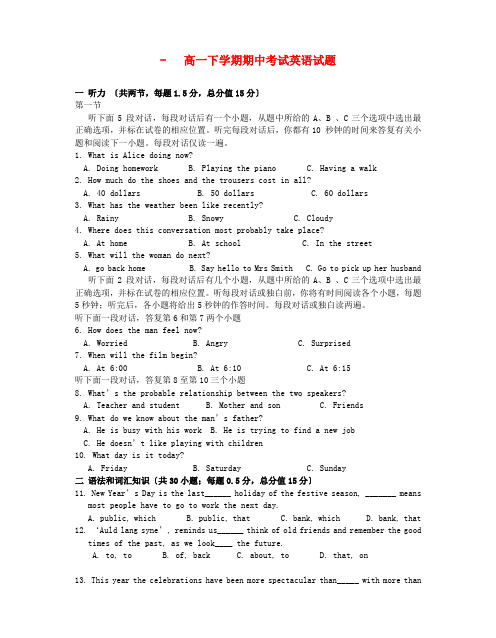
- 高一下学期期中考试英语试题一听力〔共两节,每题1.5分,总分值15分〕第一节听下面5 段对话,每段对话后有一个小题,从题中所给的A、B 、C三个选项中选出最正确选项,并标在试卷的相应位置。
听完每段对话后,你都有10 秒钟的时间来答复有关小题和阅读下一小题。
每段对话仅读一遍。
1. What is Alice doing now?A. Doing homeworkB. Playing the pianoC. Having a walk2. How much do the shoes and the trousers cost in all?A. 40 dollarsB. 50 dollarsC. 60 dollars3. What has the weather been like recently?A. RainyB. SnowyC. Cloudy4. Where does this conversation most probably take place?A. At homeB. At schoolC. In the street5. What will the woman do next?A. go back homeB. Say hello to Mrs SmithC. Go to pick up her husband听下面2 段对话,每段对话后有几个小题,从题中所给的A、B 、C三个选项中选出最正确选项,并标在试卷的相应位置。
听每段对话或独白前,你将有时间阅读各个小题,每题5秒钟;听完后,各小题将给出5秒钟的作答时间。
每段对话或独白读两遍。
听下面一段对话,答复第6和第7两个小题6. How does the man feel now?A. WorriedB. AngryC. Surprised7. When will the film begin?A. At 6:00B. At 6:10C. At 6:15听下面一段对话,答复第8至第10三个小题8. What’s the probable relationship between the two speakers?A. Teacher and studentB. Mother and sonC. Friends9. What do we know about the man’s father?A. He is busy with his workB. He is trying to find a new jobC. He doesn’t like playing with children10. What day is it today?A. FridayB. SaturdayC. Sunday二语法和词汇知识〔共30小题;每题0.5分,总分值15分〕11. New Year’s Day is the last______ holiday of the festive season, _______ meansmost people have to go to work the next day.A. public, whichB. public, thatC. bank, whichD. bank, that12. ‘Auld lang syne’, reminds us______ think of old friends and remember the goodtimes of the past, as we look____ the future.A. to, toB. of, backC. about, toD. that, on13. This year the celebrations have been more spectacular than_____ with more than200,000 people congregating to watch a huge parade of lions, dragons and drums.A. thatB. everC. neverD. before14. However, the traditions often______ from place to place.A. differentB. differenceC. differD. various15. Local police say it should not be too difficult to spot as it is two metres talland______ 60kg.A. weightB. weighsC. is weighedD. is weight16. But there’s also a tradition of large companies_______ to fool a lot of people.A. attemptB. attemptedC. to attempt D attempting17. They were_____ popular that their fans formed clubs in order to get morefamiliar_____ them.A. so, withB. too, withC. so, toD. too, to18. The band_______ about 1970, but happily they reunited ____ the mid-1980s.A. broke out, inB. broke down, onC. broke up, inD. broke off, on19. You should_____ more attention to the rain forest where I live andappreciate_____ the animals live together.A. give, whyB. pay, howC. draw, whenD. take, where20. Daisy_____ and found that she was being watched by an elephant.A. turned overB. turned onC. turned aroundD. turned down21. For the Japanese festival Obon, people should go to______ graves and lightincense_______ their ancestors.A. honor, in celebration ofB. clean, in memory ofC. visit, in the honor ofD. satisfy, in praise of22. She said she would be there at seven o’clock, and he thought she would_______.A. keep her wordB. keep her wordsC. make her wordD. break her words23. Something terrible_______ if Li Chang was not coming to eat in hisrestaurant_____ he always did.A. should have happened, likeB. must have happened, asC. could have happened, whenD. need have happened, as24. They______ raw vegetables with the hamburgers and boiled the potatoes_____ friedthem.A. offered, other thanB. were offered, rather thanC. served, rather thanD. were served, other than25. Now perhaps, sir, if you_____ your bill I can help the other customers.A. pay forB. pay offC. pay backD. pay26. ---I wonder, Mr Adams, ____ you’d mind us asking a few questions.---_______. Go right ahead.A. if, Not at allB. if, Of courseC. whether, SureD. whether,All right27. We should plant a lot of trees in the mountain. They can_____ the sand______away by the rainwater.A. protect, from being washedB. keep, washedC. prevent, washingD. stop, to wash28. The two children, _______ parents passed away, _______by their aunt.A. their, grew upB. whose, were grown upC. of whom, were broughtD. whose, were brought up29. ____ all the books on the desk, ______ is of any use for our study.A. With, nothingB. With, noneC. Of, noneD. Of, no one30. I know he hasn’t finished the work, but_____, he’s done his best.A. at allB. in allC. after allD. best of all31. ---Remember______ we met, Jim?---Of course I do. You______ in the library.A. the first time, readB. the first time, were readingC. for the first time, have readD. for the first time, had read32. We should spend the money ______ something _____ everyone.A. in; that benefitB. on; which benefitC. in; which benefitsD. on; that benefits33. ---- Happy New Year to you!---- ______! By the way, how do people ______ New Year in your country?A. Thanks; honourB. Happy New Year to you; respectC. It’s kind of you; congratulateD. The same to you; celebrate34. Just on the first day of the summer day they _____ for Mount Tai for a climbing.A. set asideB. set downC. set offD. set up35. Our textbook______ five units in all, _______ Festivals around the world.A. includes, containingB. includes, containedC. contains, includingD. contains, included36. Jack, you ______ play with the knife; you ______ hurt yourself.A. won’t; can’tB. mustn’t; mayC. shouldn’t; mustD.can’t; should37. ---Do you know______ he is studying now?---He may study at Oxford or Cambridge. I am not sure of______.A. which, whatB. which, whereC. where, whichD. where, what38. ---Excuse me, what time is it now?---Sorry, my watch______. It is________ at the shop.A. isn’t working, repairingB. isn’t working, being repairedC. doesn’t work, repairedD. doesn’t work, being repaired39. Being examined twice a year, whether it is a car or a bus or a truck, it is therule that every driver____ obey in this city.A. shallB. canC. has toD. need40. ---Will you do me the honor of dancing with me?--- _____.A. That’s a good idea.B. Thank you all the same.C. I’d love to, but I’m wanted on the phone.D. Oh, it’s very kindof you.三完型填空〔每题1.5分,共30分〕He drove after drinking alcohol, having a severe accident and had to get his arms removed.Since then, he has had to __41__ on his younger brother, who became his shadow, never leaving him alone for years. Except for writing with his toes, he was totally unable to do __42__ else. As the two brothers grew up together, they had their own problems and would often __43__. Finally, his younger brother went away and lived __44__, leaving him heartbroken and at a loss what to do.__45__, a misfortune befell〔降临〕a girl. One night she was preparing dinner when the kerosene light on the stove was overturned, __46__ in a fire which took her hands away. Having decidedly __47__ her sister’s willingness to help her, she determined to be thoroughly __48__. At school, she always studied hard.Most of all she learned to be self-rel iant. “I am lucky. Though my __49__ are broken, my heart can still fly.〞 she wrote in her blog.One day, the young man and the girl were both invited to a〔n〕__50__ programme. The boy told the television hostess about his __51__ future, whereas the girl was full of __52__ for her life. They were both asked to write something on a piece of paper with their __53__. The boy: My younger brother’s arms are my arms. The girl: Broken wings, flying heart.They had both gone through the same ordeal〔痛苦经历〕, but their different __54__ determined the nature of their lives. As seems the case, __55__ disasters can strike our life at any time. How you handle the __56__ when faced with it is the true __57__ of your character. If you choose to __58__ or escape from the ordeal, it will follow you wherever you go. But if you decide to be strong, the __59__ will turn out to be a fortune on which new __60__will arise.41.A.live B.stand C.rely D.assist 42.A.something B.everything C.nothing D.anything 43.A.quarrel B.share C.support D.dislike 44.A.happily B.lonely C.separately D.disappointedly 45.A.Unfortunately B.Unexpectedly C.Similarly D.Naturally 46.A.leading B.bringing C.causing D.resulting 47.A.turned to B.turned down C.turned off D.turned against 48.A.alone B.free C.independent D.successful 49.A.arms B.legs C.dreams D.promises 50.A.interview B.radio C.sports D.health 51.A.hopeful B.uncertain C.bright D.miserable 52.A.calmness B.enthusiasm C.patience D.excitement 53.A.hands B.strength C.toes D.mouths 54.A.characters B.desires C.opinions D.attitudes 55.A.unexpected B.passive C.rough D.serious 56.A.emergency B.misfortune C.difficulty D.accident57.A.test B.reflection C.display D.problem 58.A.ignore B.resist C.complain D.suffer 59.A.problem B.result C.failure D.hardship60.A.solutions B.ways C.rewards D.hopes四阅读理解 (共20小题,每题2分, 总分值40分)AIn 1812, in a village near Paris, France, a little boy had a terrible accident. He hit himself in the eye with one of his father's sharp tools, and became blind. His name was Louis Braille, and he was only four years old.He was a clever little boy, and he soon learned to “see〞 without his eyes. He touched things, or smelled them, or tasted them. His family described things to him. Although he couldn’t see people’s faces, he learned to recognize their voices. After his seventh birthday, Louis went to the little school in the village. But there weren’t any books for him. His classmates read his lessons to him and his sisters helped him with his homework. He learned his lessons well, but he couldn’t learn to read or write.In 1819, the village priest (牧师) told Louis Braille's story to the director of a famous school for blind boys. At this school, boys learned math, grammar, geography, history, and music. And they learned to read!Louis went to the school in Paris in February, 1819. He loved his classes and received high grades. He learned to play the piano and to knit (编织) hats and sweaters. And he learned to read — with his fingers!The raised-print letters in the books at school stood up from the surface of the paper. Louis could feel them with his fingers. He was able to recognize some of them easily, but some of them were difficult. The letters had to be very large, and sometimes there were only a few letters on a page. The books were huge and heavy. And they were expensive. There were only fourteen books in the school library! Louis read the three or four books for his class again and again. He tried to think of a better way to make books for blind people. He experimented with new alphabets. After about three years, Louis invented a system of raised dots. The other students thought Louis's system was wonderful. They were able to read it easily, and they learned to write, too.Today, there are thousands of Braille books for blind people. Louis Braille was only fifteen years old when he invented his wonderful system!61. Without his eyes, he could also “see〞 by _________ .A. touching thingsB. smelling or tasting thingsC. trying to recognize people's voicesD. all the above ways62. He went to _________ in February, 1819.A. a famous school for blind boys in ParisB. a music school for blind peopleC. a private school for blind peopleD. a school for blind people far away from Paris63. Louis Braille became famous because he invented ____ .A. the English alphabetB. a system of raised dots to make books for blind peopleC. books for blind people to learn mathsD. grammar books for blind people64. According to the passage, which of the following is true?A. His father’s carelessness made Louis Braille blindB. With the help of priest, Louis Braille went to the school in Paris in 1819C. Louis Braille is the only one who reads with fingers in the school.D. It took him about 15 years to invent a system of raised dots65. The main idea of this passage is that ____.A. Louis was a good student at the school in ParisB. he learned to “see〞 with the help of booksC. he invented a system of raised dots to make books easier for blind people to readD. there are thousands of Braille books for blind peopleBDiet Coke, diet Pepsi, diet pills, no-fat diet, vegetable diet… We are surrounded by the word “diet〞 everywhere we look and listen. We have so easily been attracted by the promise and potential of diet products that we have stopped thinking about what diet products are doing to us. We are paying for products that harm us psychologically (心理) and physically.Diet products significantly weaken us psychologically. On one level, we are not allowing our brain to admit that our weight problems lie not in actually losing the weight, but in controlling the consumption(消费) of fatty, high-calorie, unhealthy foods. Diet products allow us to jump over the thinking stage and go straight for the scale(秤) instead. All we have to do is to swallow(吞咽) or recognize the word “diet〞 in food labels.On another level, diet products have greater psychological effects. Every time we have a zero-calorie drink, we are telling ourselves without our awareness that we don’t have to work to get results. Diet products make people believe that gain comes without pain, and that life can be without resistance and struggle.The danger of diet products lies not only in the psychological effects they have on us, but also in the physical harm that they cause. Diet foods can indirectly harm our bodies because consuming them instead of healthy foods means we are preventing our bodies from having basic nutrients(营养成分). Diet foods and diet pills contain zero calorie only because the diet industry has created chemicals to produce these wonder products. Diet products may not be nutritional, and the chemical that go into diet products are potentially dangerous.Now that we are aware of the effects that diet products have on us, it is time to seriously think about buying them. Losing weight lies in the power of minds, not in the power of chemicals. Once we realize this, we will be much better able to resist diet products, and therefore prevent the psychological harm that comes from using them .68. In Paragraph 3, “gain comes without pain〞 probably means ______.A. losing weight is effortlessB. it costs a lot to lose weightC. diet products bring no painD. diet products are free from calories69. Diet products indirectly harm people physically because such products ______.A. are over-consumedB. lack basic nutrientsC. are short of chemicalsD. provide too much energy70. Which of the following can be the best title of the passage?A. diet products: a good choice for losing weightB. diet products and basic nutrientsC. the diet zone: an attractive placeD. the diet zone: a dangerous placeCLet children learn to judge their own work. A child learning to talk does not learn by being corrected all the time: if corrected too much, he will stop talking. He notices a thousand times a day the difference between the language he uses and the language those around him use. Bit by bit, he makes the necessary changes to make his langua ge like other people’s. In the same way, children learn to do all th e other things they learn to do without being taught--- to walk, run, climb, whistle, ride a bicycle --- compare their own performances with those of more skilled people, and slowly make the needed changes. But in school we never give a child a chance to find out his mistakes for himself, let alone(更不用说) correct them. We do it all for him. We act as if we thought that he would never notice a mistake unless he was made to. Soon he becomes dependent on the teacher. Let him do it himself. Let him work out, with the help of other children if he wants it, what this word says, what the answer is to that problem, whether this is a good way of saying or doing this or not.If it is a matter of right answer, as it may be in mathematics or science, give him the answer book. Let him correct his own papers. Why should we teachers waste time on such routine(常规的) work? Our job should be to help the child when he tells us that he can’t find the way to get the right answer. Let’s end all this nonsense of grades, exams and marks. Let us throw them all out, and let the children learn what all educated persons must someday learn: how to measure their own understanding, how to know what they know or do not know.Let them get on with this job in the way that seems most sensible(合情理的) to them, with our help as school teachers if they ask for it. The idea that there is a body of knowledge to be learnt at school and used for the rest of one’s life is nonsense(无意义的) in a world as complicated and rapidly changing as ours. Anxiousparents and teachers say, “But suppose they fail to learn something essential(根本的), something they will need to get on in the world?〞Don’t worry! If it is essential, they will go out into the world and learnt it.71. What does the writer think is the best way for children to think?A. By listening to their parents’ instructions.B. By asking a great many questions.C. By making mistakes and having them corrected.D. By copying what other people do.72. What does the writer think teachers should NOT do?A. Give children correct answers.B. Point out children’smistakes to them.C. Allow children to mark their own work.D. Encourage children to copyone another.73. According to the passage, learning to speak and learning to ride a bike are _____.A. the most important skills.B. the basic skills children should masterC. almost the same as learning other skillsD. much different from learning other skills.74. The writer is afraid that children will grow up into adults who are ______.A. too selfishB. too independentC. dependent and unable to use basic skillsD. able to think for themselves75. The passage makes us believe_______.A. while children learn to do something, they usually make the necessary changesB. Children won’t correct their mistakes until teachers point them outC. It is necessary for teachers to correct children’s papers and homeworkD. Children will learn better if they depend on their teachers and parentsDFor years I wanted a flower garden. I’d spend hours thinking of different things I could plant that would look nice together. But then we had Matthew. And Marvin. And the twins, Alisa and Alan. And then Helen. Five children. I was too busy raising them to grow a garden.Money was tight, as well as time. Often when my children were little, one of them would want something that cost too much, and I'd have to say, "Do you see a money tree outside? Money doesn't grow on trees, you know."Finally, all five got through high school and college and were off on their own.I started thinking again about having a garden.I wasn't sure, though. I mean, gardens do cost money, and after all these years I was used to living on a pretty lean no-frills budget.Then, one spring morning, On Mother’s Day, I was working in my kitchen. Suddenly, I realized that cars were tooting their horns (按喇叭) as they drove by. I looked out of the window and there was a new tree, planted right in my yard. I thought it must be a weeping willow (垂柳), because I saw things blowing around on all itsbranches. Then I put my glasses on - and I couldn't believe what I saw. There was a money tree in my yard!I went outside to look. It was true! There were dollar bills, one hundred of them, taped all over that tree. Think of all the garden flowers I could buy with one hundred dollars! There was also a note attached: "IOU eight hours of digging time. Love, Marvin."Marvin kept his promise, too. He dug up a nice ten-by-fifteen foot bed for me. And my other children bought me tools (工具), ornaments (装饰物), a trellis (棚架), a sunflower stepping stone and gardening books.That was three years ago. My garden's now very pretty, just like what I wanted. When I go out and weed or tend my flowers, I don't seem to miss my children as much as I once did. It feels like they're right there with me.I live up in Michigan's Upper Peninsula, where winters are long and cold, and summers are way too short. But every year now, when winter sets in, I look out my window and think of the flowers I'll see next spring in my little garden. I think about what my children did for me, and I get tears in my eyes—every time.I'm still not sure that money grows on trees. But I know love does!76.The writer stopped thinking about having a flower garden because__ ___.A. she was too busyB.her children were off on their ownC. she was too oldD.her children had finished school77. The underlined word “no - frills〞 in the fourth paragraphs is similar in meaning to_____.A.painful B.tight C.looseD.helpful78. The “IOU〞 on the note is short for ___ .A. I Love YouB. I Belong to YouC. I Owe YouD. I Offer You79.The underlined part "Do you see a money tree in the yard? Money doesn’t grow on trees,"actually means______.A. We have many money treesB. We have enough money tobuy itC. We can’t afford to buy itD. We have muchmoney on the tree80.Which of the following statements is TRUE according to the passag e?A. The writer put one hundred dollar bills on the tree to decorate it.B.The writer was wearing her glasses when she saw the weeping willow.C.The children bought their mother a new garden and some gardening books.D. The flowers in the garden make the writer feel that her children are with her.五单词拼写(共10小题,每题1分, 总分值10分)81. He a___________ to me for what he had done the other day and asked me toforgive him.82. Singers on the stage usually wear fashionable clothes and look verya__________.83. In spite of the poor medical equipment, the doctor s_______ in saving hisleg.84. Radio stations that b___________ music have disc jockeys who introduce andcomment on the music.85. Visitors are not p_________ to take photos in the temple.86. The growing crops are_________〔影响〕by freezing weather and rainy dayson end.87. When people think of the_________(场景) where the boy was eaten by the tiger,they dare not go to the forest.88. It is____________〔显然〕that he is interested in music as well as painting.89. You shouldn’t have done it without __________(商量) me.90. We are doing our best with the _________(有限的) resources available. 六短文改错( 总分值10分)增加:在缺词处加一个漏字符号〔∧〕,并在其下面写出该加的词。
浙江省杭州高级中学高一下学期期中考试(英语).doc
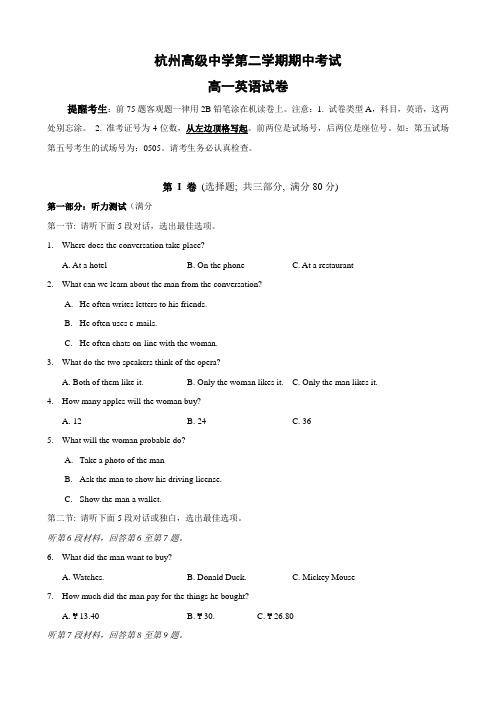
杭州高级中学第二学期期中考试高一英语试卷提醒考生:前75题客观题一律用2B铅笔涂在机读卷上。
注意:1. 试卷类型A,科目,英语,这两处别忘涂。
2. 准考证号为4位数,从左边顶格写起。
前两位是试场号,后两位是座位号。
如:第五试场第五号考生的试场号为:0505。
请考生务必认真检查。
第I 卷(选择题; 共三部分, 满分80分)第一部分:听力测试(满分第一节: 请听下面5段对话,选出最佳选项。
1.Where does the conversation take place?A. At a hotelB. On the phoneC. At a restaurant2.What can we learn about the man from the conversation?A.He often writes letters to his friends.B.He often uses e-mails.C.He often chats on-line with the woman.3.What do the two speakers think of the opera?A. Both of them like it.B. Only the woman likes it.C. Only the man likes it.4.How many apples will the woman buy?A. 12B. 24C. 365.What will the woman probable do?A.Take a photo of the manB.Ask the man to show his driving license.C.Show the man a wallet.第二节: 请听下面5段对话或独白,选出最佳选项。
听第6段材料,回答第6至第7题。
6.What did the man want to buy?A. Watches.B. Donald Duck.C. Mickey Mouse7.How much did the man pay for the things he bought?A. ¥ 13.40B. ¥ 30.C. ¥ 26.80听第7段材料,回答第8至第9题。
浙江省杭州第二中学2019届高一下学期期中考试英语试卷Word版含解析
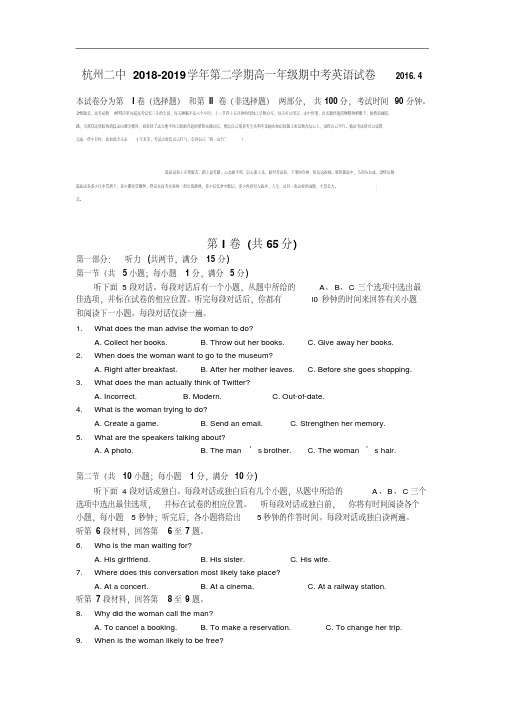
杭州二中2018-2019学年第二学期高一年级期中考英语试卷2016. 4本试卷分为第I卷(选择题)和第II卷(非选择题)两部分,共100分,考试时间90分钟。
金榜题名,高考必胜!蝉鸣声里勾起高考记忆三年的生活,每天睡眠不足六个小时,十二节四十五分钟的课加上早晚自习,每天可以用完一支中性笔,在无数杯速溶咖啡的刺激下,依然活蹦乱跳,当我穿过昏暗的清晨走向教学楼时,我看到了远方地平线上渐渐升起的黎明充满自信,相信自己很多考生失利不是输在知识技能上而是败在信心上,觉得自己不行。
临近考试前可以设置完成一些小目标,比如说今天走1万步等,考试之前给自己打气,告诉自己“我一定行”!最新试卷十年寒窗苦,踏上高考路,心态放平和,信心要十足,面对考试卷,下笔如有神,短信送祝福,愿你能高中,马到功自成,金榜定题最新试卷多少汗水曾洒下,多少期待曾播种,终是在高考交卷的一刹尘埃落地,多少记忆梦中惦记,多少青春付与流水,人生,总有一次这样的成败,才算长大。
名。
第I卷(共65分)第一部分:听力(共两节,满分15分)第一节(共5小题;每小题1分,满分5分)听下面5段对话。
每段对话后有一个小题,从题中所给的A、B、C三个选项中选出最佳选项,并标在试卷的相应位置。
听完每段对话后,你都有l0秒钟的时间来回答有关小题和阅读下一小题。
每段对话仅读一遍。
1. What does the man advise the woman to do?A. Collect her books.B. Throw out her books.C. Give away her books.2. When does the woman want to go to the museum?A. Right after breakfast.B. After her mother leaves.C. Before she goes shopping.3. What does the man actually think of Twitter?A. Incorrect.B. Modern.C. Out-of-date.4. What is the woman trying to do?A. Create a game.B. Send an email.C. Strengthen her memory.5. What are the speakers talking about?A. A photo.B. The man’s brother.C. The woman’s hair.第二节(共10小题;每小题1分,满分10分)听下面4段对话或独白。
- 1、下载文档前请自行甄别文档内容的完整性,平台不提供额外的编辑、内容补充、找答案等附加服务。
- 2、"仅部分预览"的文档,不可在线预览部分如存在完整性等问题,可反馈申请退款(可完整预览的文档不适用该条件!)。
- 3、如文档侵犯您的权益,请联系客服反馈,我们会尽快为您处理(人工客服工作时间:9:00-18:30)。
杭州二中2015学年第二学期高一年级期中考英语试卷本试卷分为第I卷(选择题)和第II卷(非选择题)两部分,共100分,考试时间90分钟。
第I卷 (共65分)第一部分:听力 (共两节,满分15分)第一节(共5小题;每小题1分,满分5分)听下面5段对话。
每段对话后有一个小题,从题中所给的A、B、C三个选项中选出最佳选项,并标在试卷的相应位置。
听完每段对话后,你都有l0秒钟的时间来回答有关小题和阅读下一小题。
每段对话仅读一遍。
1. What does the man advise the woman to do?A. Collect her books.B. Throw out her books.C. Give away her books.2. When does the woman want to go to the museum?A. Right after breakfast.B. After her mother leaves.C. Before she goes shopping.3. What does the man actually think of Twitter?A. Incorrect.B. Modern.C. Out-of-date.4. What is the woman trying to do?A. Create a game.B. Send an email.C. Strengthen her memory.5. What are the speakers talking about?A. A photo.B. The man’s brother.C. The woman’s hai r.第二节(共10小题;每小题1分,满分10分)听下面4段对话或独白。
每段对话或独白后有几个小题,从题中所给的A、B、C三个选项中选出最佳选项,并标在试卷的相应位置。
听每段对话或独白前,你将有时间阅读各个小题,每小题5秒钟;听完后,各小题将给出5秒钟的作答时间。
每段对话或独白读两遍。
听第6段材料,回答第6至7题。
6. Who is the man waiting for?A. His girlfriend.B. His sister.C. His wife.7. Where does this conversation most likely take place?A. At a concert.B. At a cinema.C. At a railway station.听第7段材料,回答第8至9题。
8. Why did the woman call the man?A. To cancel a booking.B. To make a reservation.C. To change her trip.9. When is the woman likely to be free?A. In February.B. In March.C. In half a year.听第8段材料,回答第10至12题。
10. W hy is the woman moving?A. To save money.B. To build a career.C. To escape cold weather.11. W hat happened to the clubs in San Francisco?A. They were burned down.B. They were pulled down.C. They were turned into restaurants.12. What is the woman’s dream?A. Becoming famous.B. Getting married.C. Attending performances.听第9段材料,回答第13至15题。
13. W hat attracts most tourists to Mexico City?A. Delicious food.B. Various activities.C. Colorful nightlife.14. W hy does the speaker mainly suggest walking around?A. To do shopping.B. To kill time.C. To talk with people.15. W hat is the purpose of this talk?A. To inform students of the city.B. To encourage people to visit.C. To introduce a different culture.第二部分:语言运用(共三节,满分30分)第一节:词汇单选(共10个小题;每小题0.5分,满分5分)16. Scientists have found that heavy drinking can cause _______ brain damage in teenagers, whichmay never recover.A. permanentB. addictedC. obviousD. diverse17. State leaders joined the discussions with the country’s political advisors yesterday, calling for efforts to _______ the global financial crisis (危机).A. try out forB. stick withC. blow awayD. pull through18. China can _______ a global role in improving public health by sharing some of its vaccines(疫苗) with other developing countries.A. take effectB. fix upC. take onD. pile up19. Vice-Premier Li Keqiang said that more effort should be made to save land and _______ in orderto reduce consumption (消耗) and improve the efficiency (效益) of the economy.A. conflictsB. resourcesC. agenciesD. expenses20. A man named Daredevil Nik Wallenda _______ his lifelong dream and became the first personto walk across Niagara Falls on a high wire.A. possessedB. contributedC. fulfilledD. charged21. Carrying a plastic shopping bag is quite normal in China, but in Rwanda it’s illegal. Suchan act will _______.A. get along well with itB. get you in hot waterC. get the hang of itD. get you across the river22. Could you please make a move? You’re throwing a _______ on my book so I can’t see the words clearly.A. blockB. bondC. titleD. shadow23. Signs of “Bus Only, 7:00-9:00, 16:30-18:30” are painted in white to prevent vehicles fromusing the bus _______ during rush hours every day.A. lanesB. pavementC. systemD. station24. The International Olympic Committee (IOC) once expressed concern over Rio’s ability to buildall the necessary _______ for the 2016 Summer Olympics in time.A. appliancesB. facilitiesC. toolsD. devices25. The director was facing a lot of doubts. In _______, he simply posted on weibo calling onpeople to concern more about his movies.A. practiceB. responseC. turnD. theory第二节:完形填空(共15个小题;每小题1分,满分15分)阅读下面的短文,从短文后所给的A、B、C、D四个选项中,选出可以填入空白处的最佳选项。
A woman nam ed Emily renewing her driver’s license at the County Clerk’s office was asked to state her occupation. She __26__, uncertain how to classify herself.“What I mean is,” explained the recorder, “do you have a job, or are you just a …”“__27__ I have a job,” said Emily. “I’m a mother.”“We don’t list ‘mother’ as an occupation… ‘housewife’ __28__ it,” said the recorder.One day I found myself in the same __29__. The clerk was obviously a career woman, efficient, confident and possessed of a high sounding title like, “Official Interrogator” or “Town Registrar. ” “What is your occupation?” she asked.Somehow, the words simply __30__. “I’m a Research Associate in the field of Child Development and Human Relations.”The clerk paused, ballpoint pen __31__ in midair, and looked up as though she had not heard right.I repeated the __32__ slowly, then I stared __33__ as my statement was written in bold, black ink on the official questionnaire.“Might I ask,” said the clerk with new interest, “just what you do in this field?”__34__, without any trace of panic in my voice, I heard myself reply, “I have a continuing program of research (what mother doesn’t), in the lab and in the field (normally I __35__ indoors and out). Of course, the job is one of the most demanding in the humanities (any mother care to disagree?), and I often work 14 hours a day (24 is more like __36__), but rewards are more of a satisfaction __37__ just money.”There was an increasing __38__ of respect in the clerk’s voice as she completed the form, stood up, and showed me out.As I drove into our driveway, buoyed up (受鼓舞) by my glamorous new career, I was greeted by my lab assistants-- ages 13, 7, and 3. Upstairs I could hear our new experimental model (a6 month old baby), in the child-development program, __39__ a new vocal pattern.I felt proud! I had gone on the official records as someone more distinguished and indispensable (不可缺少的) to mankind than “just another mother.”Motherhood…What a glorious career! __40__ when there’s a title on the door.26. A. doubted B. interrupted C. hesitated D. admired27. A. Above all B. Of course C. In reality D. For example28. A. covers B. lists C. replaces D. means29. A. office B. way C. lab D. situation30. A. mixed up B. faded away C. spread about D. popped out31. A. frozen B. shaking C. dropped D. flying32. A. career B. title C. field D. question33. A. with anger B. in despair C. with wonder D. in curiosity34. A. Fortunately B. Excitedly C. Obviously D. Coolly35. A. would have said B. dare say C. must have said D. could say36. A. them B. it C. one D. others37. A. other than B. together with C. rather than D. instead of38. A. note B. sound C. amount D. praise39. A. accounting for B. getting away with C. testing out D. playing jokes on40. A. Certainly B. Unexpectedly C. Usually D. Especially第三部分:阅读理解(共两节,满分30分)第一节(共11个小题;每小题2分,满分22分)阅读下列短文,从每题所给的A、B、C、D四个选项中,选出最佳选项。
